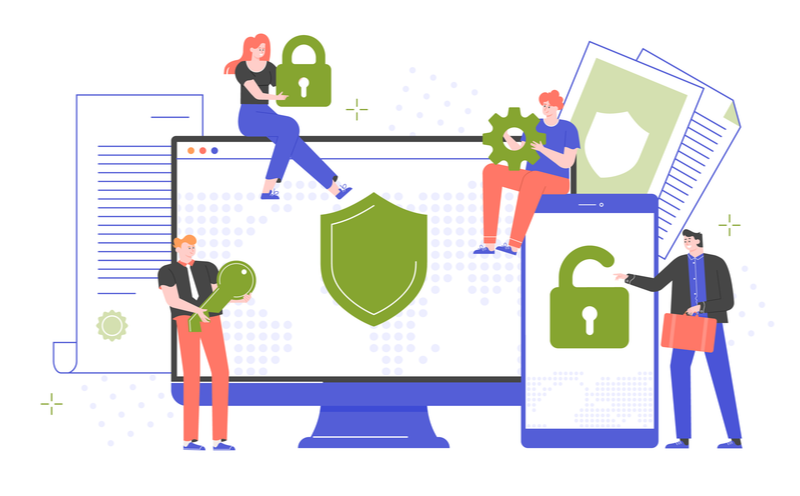Free Cybersecurity Course
Enter the cybersecurity field with our free introductory course. Learn the basics and build a strong foundation.
In today’s digital age, cybersecurity transcends basic protection against hackers—it involves analyzing and securing communication networks, and crafting policies for data management on the Internet. Given the field’s breadth and critical importance, job prospects for cybersecurity professionals are burgeoning. The U.S. Bureau of Labor Statistics anticipates a 33% job growth from 2020 to 2030, far outpacing other fields with thousands of new positions opening annually.
If you’re exploring a career in cybersecurity, you’re poised for a promising future. This guide will outline essential steps and insights to help you become a cybersecurity analyst—let’s dive in!
Table of Contents
What Is a Cybersecurity Analyst and What Do They Do?
Cybersecurity analysts, also known as information security analysts, are the guardians of a company’s information systems. Their primary role is to build robust IT security infrastructures and analyze them to ensure they minimize potential threats. As technology and cyber-attacks become more sophisticated, these professionals must continually adapt to preemptively defend against and prevent security breaches.
Cybersecurity analysts are crucial in maintaining that only authorized personnel can access a company’s sensitive software and hardware. Their responsibilities vary depending on the size of the organization. In smaller companies, a cybersecurity job might involve a broad range of tasks from penetration testing to real-time threat detection and policy development, whereas larger organizations often have more specialized roles.
Key duties include:
- System Analysis: Examining existing systems and networks to assess their security posture.
- Security Enhancements: Developing encryption protocols, installing firewalls, and updating software to bolster security frameworks.
- Monitoring and Response: Observing network traffic for unusual activity, detecting threats in real time, and responding to security incidents with detailed incident logs and reports.
- Vulnerability Management: Identifying and patching detected vulnerabilities to fortify security.
- Regular Assessments: Conducting comprehensive risk analyses, penetration tests, and other essential cybersecurity measures to ensure continuous protection.


Become a Cybersecurity Analyst. Land a Job or Your Money Back.
Conduct vulnerability assessments into on-premise and cloud security risks. Work 1:1 with an industry mentor. Graduate with a CompTIA Security+ Certification. Land a job — or your money back.
How To Become a Cybersecurity Analyst
Embarking on a career as a cybersecurity analyst requires navigating a series of strategic educational and practical steps. As the digital landscape evolves, so does the need for skilled professionals who are well-prepared to protect information systems. This guide walks you through the critical milestones—from choosing the right educational path to applying your skills in real-world settings—ensuring you gain the comprehensive insights needed to thrive in the world of cybersecurity.
Understanding Your Educational Path: Bootcamps vs. Degrees
Choosing the right educational option is a foundational decision for your cybersecurity career. This section compares the fast-paced, skill-focused cybersecurity bootcamps with the in-depth, theory-rich environment of traditional degree programs to help you decide which path aligns best with your career goals.
Exploring Your Options
The journey to becoming a cybersecurity analyst can begin in several ways, and the choice between attending a bootcamp and pursuing a degree hinges on your career goals, time availability, and financial resources. Each path offers unique advantages and can set the stage for your entry into the field.
- Bootcamps: Designed for rapid learning and practical skill acquisition, cybersecurity bootcamps condense essential knowledge into a few months, allowing for quick entry into the field.
- Degrees: A more traditional path involves obtaining a bachelor’s or master’s degree in cybersecurity, computer science, or a related field. Degrees offer a comprehensive education that encompasses theoretical knowledge and practical skills over a longer period.
- Combination Paths: Some may choose to start with a bootcamp to gain entry-level employment and later pursue a degree to expand their opportunities and deepen their expertise.
Learn the Cybersecurity Fundamentals
Before tackling the more complex aspects of cybersecurity, it’s crucial to grasp the fundamentals that form the backbone of all security practices. This part of the guide will cover how and where you can acquire the necessary foundational knowledge to advance in this field.
Building a Strong Foundation
Before you dive into the more technical aspects of cybersecurity, it’s crucial to understand its foundational concepts. This broad base of knowledge will inform all your future learning and professional activities.
- Stay Informed: Regularly reading cybersecurity publications and tech news keeps you updated on the latest threats and innovations.
- Basic Concepts: Start with the core principles of cybersecurity, including the basics of cryptography, software security, and threat modeling.
- Continuing Education: Attend workshops and seminars to keep abreast of new developments and to network with other professionals.
Acquire Essential Cybersecurity Skills
Cybersecurity professionals must possess a diverse set of technical and soft skills to effectively protect digital assets. This section discusses the key skills needed, ranging from technical prowess in systems and networks to critical soft skills like communication and problem-solving.
Skill Development
Cybersecurity is an interdisciplinary field that requires a variety of technical and soft skills. Developing these skills will prepare you to handle diverse challenges in the role.
- Technical Skills: These include programming languages relevant to security, such as Python and JavaScript, and an understanding of operating systems and database management.
- Analytical Skills: You’ll need strong problem-solving skills and the ability to analyze large sets of data to identify potential threats.
- Communication Skills: Being able to clearly communicate complex information to non-technical colleagues is essential.
Complete Courses and Obtain Certifications
Formal education through courses and certifications plays a crucial role in solidifying your knowledge and enhancing your marketability. Here, we explore the importance of continuous learning and the certifications that can help bolster your credentials as a cybersecurity professional.
Formalizing Your Expertise
Structured learning through courses and obtaining certifications are critical steps in proving your skills and knowledge in the cybersecurity field.
- Specialized Courses: Focus on areas that interest you, such as network security, ethical hacking, or malware analysis, through targeted courses.
- Certifications: Pursue certifications like CompTIA Security+, CISSP, or CEH, which validate your skills and can be crucial for career advancement.
- Lifelong Learning: Cybersecurity is an ever-evolving field, and continuous education is necessary to stay current with the latest security technologies and practices.
Engage in Practical Projects
Applying theoretical knowledge through practical projects is essential for mastering cybersecurity. This section highlights how engaging in real-world projects can deepen your understanding of complex security issues and refine your problem-solving capabilities.
Applying Knowledge in Real-World Scenarios
Hands-on projects are crucial for translating theoretical knowledge into practical expertise.
- Collaborative Projects: Join open-source projects or local hackathons to gain experience and make professional connections.
- Personal Projects: Develop your own security tools or simulations to challenge your skills and innovate in your learning.
- Internships: Seek internship opportunities that allow you to work under seasoned professionals and gain workplace experience.
Create a Detailed Portfolio
A well-crafted portfolio showcases your skills, projects, and professional approach to potential employers. In this part, we will discuss how to effectively compile and present your work to highlight your strengths and experiences in cybersecurity.
Demonstrating Your Capabilities
A comprehensive portfolio is your professional showcase, illustrating your skills, approach, and understanding of cybersecurity.
- Project Summaries: Include detailed descriptions of your roles and achievements in various projects.
- Methodologies Used: Explain the techniques and tools you employed and the reasons behind your choices.
- Results Achieved: Highlight the outcomes of your projects and how they improved security or resolved issues.
Network and Seek Mentorship
Building a professional network and finding mentors are key strategies for career development and success. This final step covers the benefits of networking, how to find a mentor, and the ways these relationships can guide and accelerate your career progression in cybersecurity.
Expanding Your Professional Circle
Networking and mentorship are invaluable for career growth and learning in the field of cybersecurity.
- Professional Associations: Join organizations such as ISACA or (ISC)² to meet peers and gain insights from experienced professionals.
- Mentorship Programs: Participate in formal mentorship programs offered through professional cybersecurity organizations or informal relationships cultivated through networking.
- Continuous Networking: Maintain and expand your professional relationships through regular engagement on professional platforms and at industry events.
Get To Know Other Cybersecurity Students
Vianey Luna
IT Security Specialist at Cooper Machinery Services
Jose Mendoza
Cyber Security Career Track Student at Springboard
Rafael Ayala
Mergers And Acquisitions at Autodesk
How Much Can You Make as a Cybersecurity Analyst?
Entry-Level Cybersecurity Analyst
The salary of a cybersecurity analyst varies depending on experience level:
What’s the Best Cybersecurity Role for You?
Jobs in cybersecurity have become more differentiated and specialized over time. There are a wide variety of roles you can take on in the cybersecurity industry. Let’s look at what’s entailed in each of those jobs so you can make an informed choice about which one is best for you.
Essential Skills for a Successful Cybersecurity Analyst
Following the exploration of various roles within the cybersecurity field, it’s crucial to understand the diverse skills that underpin success in these positions. As digital threats evolve and become more sophisticated, the skill set required to counteract these challenges must also advance.
Cybersecurity professionals need to be agile, continually updating their knowledge and capabilities to protect against the latest threats effectively. Here, we outline the key skills every aspiring cybersecurity analyst should aim to develop, ensuring they are well-equipped to safeguard digital environments.
Technical Proficiency
The bedrock of cybersecurity is a solid understanding of technical systems and the tools used to protect them. This encompasses a range of disciplines from network setup and management to the intricacies of software security. For those new to the field, beginning with a comprehensive grasp of these technical elements is essential, as they form the basis for most security measures and responses.
- Mastering Tools and Technologies: In cybersecurity, technical skills are paramount. This includes understanding and managing network security, mastering system administration, and being adept in handling security software. Learning programming languages such as Python, which is often used for scripting automation scripts and malware analysis, is also essential. Familiarity with operating systems, especially Linux, is crucial since many security tools run on this platform.
- Hands-On Practice: To gain technical proficiency, engage in hands-on practice through labs, simulations, and real-world troubleshooting. Online platforms offer virtual labs where you can safely explore and manipulate cybersecurity environments to understand system vulnerabilities and attack vectors.
Analytical Skills
Analytical prowess in cybersecurity involves more than just recognizing threats; it’s about interpreting complex data streams and deriving actionable insights. Analysts must dissect and understand the behavior of potential security threats across diverse systems and environments. Developing strong analytical skills helps in preemptively identifying and mitigating potential threats before they escalate into serious breaches.
- Critical Thinking: Being able to think critically and analyze data effectively is crucial. Cybersecurity analysts must sift through vast amounts of data to identify patterns that signify potential threats.
- Problem Solving: The ability to quickly formulate solutions to security breaches is essential. This involves not only addressing immediate issues but also foreseeing potential future vulnerabilities.
- Detail-Oriented Perspective: Paying close attention to details is vital, as minor discrepancies in data can often signal a security threat that might be overlooked by less meticulous observers.
Soft Skills
While the technical aspects of cybersecurity are critical, the human element cannot be overlooked. Soft skills such as communication, teamwork, and ethical judgment play pivotal roles in the day-to-day responsibilities of a cybersecurity analyst. These skills ensure that professionals can work effectively within teams, manage stress during crises, and uphold the highest standards of data integrity and confidentiality.
- Effective Communication: Cybersecurity professionals must be able to explain technical issues clearly to colleagues who may not have a technical background. Writing clear reports and presenting findings succinctly are part of this skill set.
- Team Collaboration: Often, you will work in a team that handles different aspects of security. Being able to collaborate effectively ensures that the organization’s security strategies are implemented smoothly.
- Ethical Integrity: Handling sensitive information responsibly and adhering to ethical standards in cybersecurity practices is non-negotiable. Trust is a major component in security roles.
Adaptability
In the ever-changing landscape of cybersecurity, adaptability is not just an advantage—it’s a necessity. Analysts must continuously evolve their strategies and approaches to stay ahead of new technologies and emerging threats. This flexibility is crucial in adapting to new challenges and environments as the digital world continues to expand and diversify.
- Continuous Learning: The field of cybersecurity is constantly changing, with new threats and technologies developing all the time. Staying informed through continuous learning—whether through formal education, certification, or self-study—is necessary to remain effective.
- Flexibility in Problem-Solving: Adapting to new threats requires flexibility in thinking and approach. Cybersecurity analysts must be ready to abandon old methods in favor of new, more effective solutions.
Project Management
Effective project management is crucial in overseeing the development and implementation of security measures within an organization. Cybersecurity projects often require coordination between multiple departments and alignment with the organization’s broader security policies and objectives. Proficiency in project management ensures that these initiatives are completed on time, within budget, and with the desired outcomes.
- Strategic Planning: Developing and executing security strategies involves careful planning and resource allocation. Understanding project management principles can help cybersecurity analysts effectively lead projects from inception to completion.
- Resource Allocation: Knowing how to allocate time and technology resources, especially in responding to and recovering from security incidents, is crucial for maintaining an organization’s overall security posture.
Cybersecurity Analyst FAQs
Can You Become a Cybersecurity Analyst With No Experience?
It helps to have a degree in computer science or a software field to land a cybersecurity analyst job. That said, individuals who have completed courses in cybersecurity, or who have a significant number of projects under their belt, do have a shot at a cybersecurity job with no prior experience.
What Is the Difference Between a Cybersecurity Analyst and a Cybercrime Investigator?
Cybersecurity analysts keep a company’s IT and network systems safe without focusing on the legality of the actions of malicious actors. Cybercrime investigators conduct inquiries into illegal activities online.
Is It Hard To Become a Cybersecurity Analyst?
It’s not hard to pick up the skills required to be a cybersecurity analyst. There are various bootcamp programs and professional certifications that you can take to quickly pick up skills in the area. The most important thing to do is find a mentor and constantly network among professionals in the field so that you’re aware of new positions when they open up. Having said that, see here, what factors make cybersecurity hard to learn.
Since you’re here…
Interested in a career in cybersecurity? With or Cybersecurity Bootcamp, you’ll get a job in the industry, or we’ll return your tuition money. Test your skills with our free cybersecurity course, and check out our student reviews. We’re a safe bet. 🔒😉






